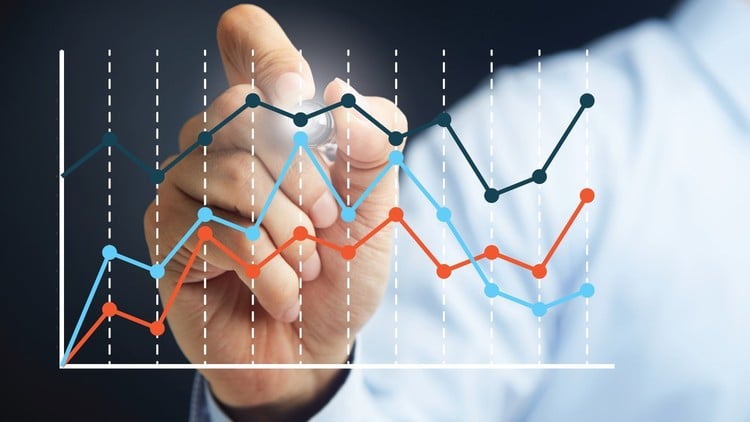
“Mastering Data Analysis and Making Informed Decisions with Statistical Hypothesis Testing in Data Science”.
⏱️ Length: 4.3 total hours
⭐ 4.20/5 rating
👥 33,241 students
🔄 December 2023 update
Add-On Information:
Note➛ Make sure your 𝐔𝐝𝐞𝐦𝐲 cart has only this course you're going to enroll it now, Remove all other courses from the 𝐔𝐝𝐞𝐦𝐲 cart before Enrolling!
- Course Overview
- This intensive course serves as your vital gateway to becoming a data-driven decision-maker, specifically tailored for the dynamic field of data science. It goes beyond rote memorization of formulas, instead cultivating a profound understanding of how statistical principles underpin robust data analysis.
- Unravel the methodology behind transforming raw datasets into actionable intelligence, learning to identify meaningful patterns, quantify uncertainty, and draw reliable conclusions that stand up to scrutiny.
- The curriculum is designed to equip you with the foundational statistical literacy necessary to critically evaluate data, build compelling arguments, and validate hypotheses, ensuring your analytical work is both sound and impactful.
- Explore the logical progression from initial data collection and exploration to sophisticated inferential analysis, all within the practical context of modern data science challenges.
- Gain clarity on how statistical thinking empowers you to move from mere correlation to causal inference, a crucial skill for any aspiring or current data professional seeking to elevate their analytical prowess.
- You’ll learn to navigate the ethical considerations and potential biases inherent in statistical analysis, fostering a responsible approach to data interpretation and presentation.
- Requirements / Prerequisites
- A fundamental grasp of basic mathematics, including algebra, is recommended to comfortably engage with the quantitative aspects of the course.
- Familiarity with foundational programming concepts, ideally with some exposure to Python, will aid in maximizing the hands-on coding exercises. No advanced Python expertise is required, as the course introduces necessary elements.
- An inquisitive mind and a keen interest in understanding data-driven insights are the most essential prerequisites.
- Access to a computer with internet connectivity and the ability to install Python and its standard libraries.
- Skills Covered / Tools Used
- Designing and Interpreting Experiments: Learn to conceptualize and execute analytical studies, understanding the statistical framework for valid data collection and hypothesis formulation, laying groundwork for A/B testing and beyond.
- Quantifying Uncertainty: Develop a nuanced understanding of how to measure and communicate the reliability of your data insights, moving beyond point estimates to provide confidence intervals and p-values that inform decision-making.
- Pattern Recognition & Relationship Discovery: Utilize statistical techniques to identify significant relationships and underlying structures within complex datasets, differentiating between true signals and random noise.
- Model Validation & Evaluation: Acquire the skills to rigorously assess the performance and validity of predictive models and analytical findings using statistical criteria, ensuring robustness and generalizability.
- Strategic Data Storytelling: Translate complex statistical findings into clear, concise, and compelling narratives for diverse audiences, supporting business decisions with evidence-based reasoning.
- Ethical Data Analysis: Cultivate an awareness of statistical pitfalls, data biases, and the responsible application of methodologies to ensure fair and accurate interpretations.
- Tools Utilized:
- Python Programming Language: The primary environment for practical application.
- NumPy: For efficient numerical operations and array manipulation.
- Pandas: Essential for data cleaning, transformation, and structured data handling.
- SciPy: Provides advanced scientific computing tools, including statistical functions.
- Matplotlib/Seaborn: For generating insightful data visualizations that support statistical analysis.
- Benefits / Outcomes
- Elevated Decision-Making Confidence: You will gain the statistical acumen to make informed, data-backed decisions, reducing reliance on intuition and increasing the reliability of your strategic choices.
- Enhanced Career Versatility: This course equips you with a highly sought-after skill set, making you a more valuable asset in roles across data science, business intelligence, research, and analytics.
- Critical Evaluation of Research: Develop the ability to critically assess statistical claims and methodologies in academic papers, industry reports, and media, fostering a more discerning perspective on data.
- Foundation for Advanced Analytics: Lay a solid conceptual and practical groundwork for delving into more complex machine learning algorithms, predictive modeling, and causal inference techniques.
- Effective Communication of Insights: Learn to articulate complex statistical findings clearly and persuasively to both technical and non-technical stakeholders, driving consensus and action.
- Problem-Solving with Data: Master a structured approach to solving real-world problems by formulating hypotheses, collecting relevant data, conducting appropriate statistical tests, and interpreting results accurately.
- PROS
- Highly Practical and Application-Oriented: Focuses on immediate applicability of statistical concepts in real data science scenarios.
- Python-Integrated Learning: Provides hands-on experience with industry-standard tools, making the learning directly transferable to professional projects.
- Strong Foundational Knowledge: Builds a robust understanding of statistical reasoning crucial for any data-related role.
- Excellent Student Satisfaction and Enrollment: High rating and large student base indicate proven effectiveness and relevance (4.20/5 rating, 33,241 students).
- Up-to-Date Content: Recently updated (December 2023), ensuring current best practices and tools are covered.
- CONS
- Given its concise duration (4.3 hours), the course provides an excellent overview and practical introduction, but might not delve into extremely advanced theoretical nuances or obscure statistical tests, requiring further independent study for specialized topics.
Learning Tracks: English,Development,Data Science
Found It Free? Share It Fast!